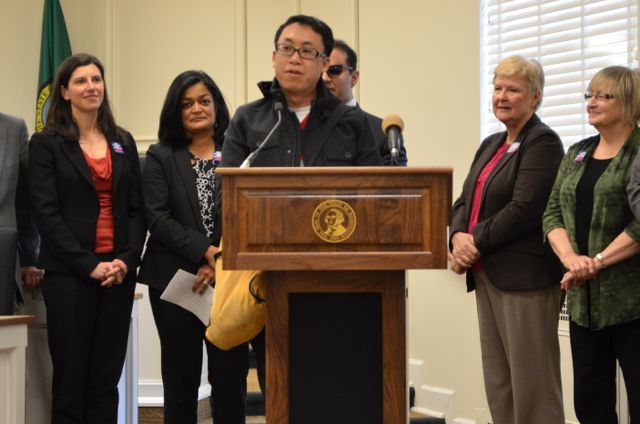
The state minimum wage would rise to $12 an hour by 2019 under a bill introduced on Thursday by House Democrats. They’re also calling for a minimum standard for paid sick days.
Democrats introduced the two bills at a press conference Thursday in a press conference with more than 20 lawmakers.
They say they aim to help workers like Peggy Meyers of Tacoma — who says she isn’t able to make ends meet, even though she has 20 years of experience as a home health care worker.
“My monthly living expenses are $1,800 a month. I only bring home $1,700 a month,” she said. “I am currently on food assistance. My gas is $200 a month and I have zero in savings.”
Bruce Lee works at a Fred Meyer in Lynnwood. He says many workers there feel taking time off for illness isn’t an option.
“So often that we have to come into work sick just so we can afford the basics of living, food, gas and rent. But that is the reality for me and my coworkers,” he said.
The current state minimum wage is $9.47 an hour — the highest state minimum wage in the nation. That’s not counting the city-wide minimum wage increases in Seattle and Seatac, where the minimum was set at $15 an hour.
The minimum wage bill would implement a $10 minimum wage in 2016, and then raise it to $10.50 in 2017, $11 in 2018, reaching $12 an hour in 2019.
Rep. Jessyn Farrell, D-Lake Stevens, introduced a minimum wage proposal last year, but the bill stalled in the House Appropriations committee.
She says the new proposal addresses some of the concerns previously raised by other legislators and small businesses. For many businesses, wages are the biggest expenditure.
“We don’t minimize that at all,” she said. To address concerns, the new bill was changed the phase-in period.
“We are stretching out modestly the implementation from three years to four years.”
Sen. Mark Miloscia of Federal Way, who switched to the Republican party when he ran for former Sen. Tracey Eide’s seat last year, also threw his support behind the minimum wage bill.
“Let’s reach out to the other side to businesses to republicans to people throughout the state, to find a win-win situation,” he said. “The fruits of our labor went to all parties, not just to stakeholders or the people who own the companies.”
The legislators also introduced a sick leave bill that would allow employees to earn paid leave to take care of illnesses or domestic violence issues.
Employers would be required to offer between five to nine days of leave depending on the size of the company.
Rep. Laurie Jinkins, D-Tacoma, described the policy as a public health issue. Allowing people to have paid sick leave would prevent them from spreading disease she said.
The CDC reported that “83 percent of the Norovirus in the country is transmitted from ill food workers. When we see what flu looks like in Washington state, people are dying,” she said.
However, Rep. Matt Manweller, the ranking Republican on the House Labor committee, told TVW he’s skeptical the bills will pass this year, when democrats have a slimmer majority than last year.
“In this session, we have Democrats rolling out $12 minimum wage, sick leave, paid vacation, and on and on and on. Taken together, how much less friendly can we make the business environment in this community?” he said.